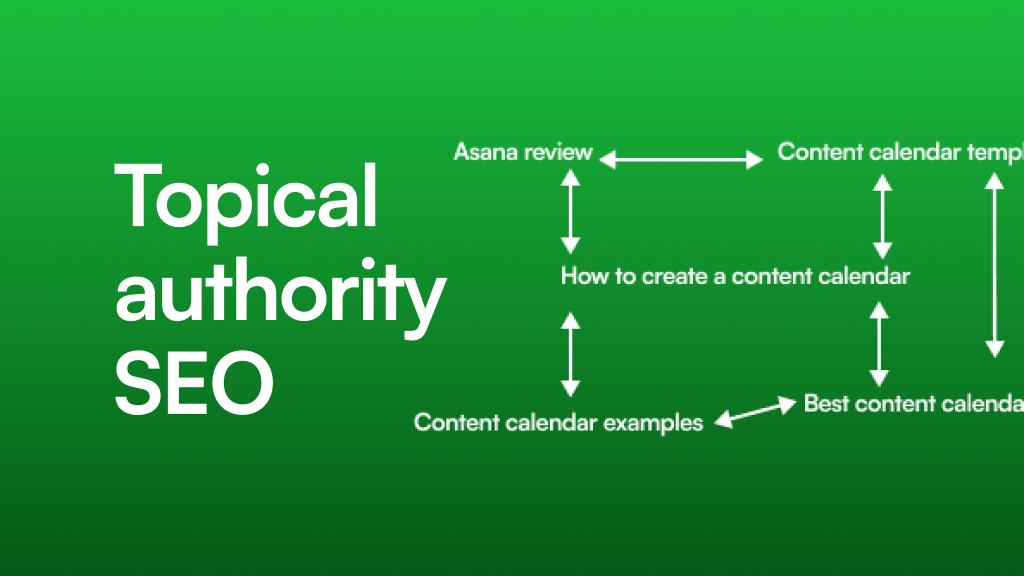After doing SEO for nine years, I’ve come to the conclusion that topical authority is the most important thing in SEO.
I started to discover this back in 2019, when I was running the blog at Webflow (a web design and development platform).
Any time we would release a blog post related to web design or web development, it would rank really fast. Often in just a few days.
But when I would try to divert a little and target a keyword related to marketing, it would never rank.
And a few years later, when I decided to start this blog, Marketer Milk, I saw the same exact patterns.
So I made my SEO (search engine optimization) approach focus heavily on topical authority. And today, I outrank some of the biggest brands (some of them publicly traded companies) because of this very reason.
So in this article, I’m going to show you what topical authority actually is and EXACTLY how to build it for your own brand.
Let’s get into it.
What is topical authority?
Topical authority is a term used in the SEO community to describe how well a website is known as a subject matter expert in a given topic. Google, ChatGPT, and most search engines love to surface websites that have developed topical authority throughout the years.
It signals that a website, or publisher, knows what they’re talking about and is most likely a good source of information on a given topic someone may be searching for.
For example, on my blog, I talk a lot about AI in marketing. I have a blog post on my favorite AI marketing tools, I have a blog post on how to create AI workflows in your marketing strategies, and I also have tons of individual reviews of AI tools.
Over the past couple years of releasing this type of content, Google has started to see my site as an authoritative figure in the topic of AI marketing. So all of my articles related to that topic tend to rank well (and fast).
The thing with search engines is that they care a lot about their user’s search experience. It’s too risky for them to surface content from a site that barely talks about a given search query. Let me explain this a bit better with an example.
Say you were searching for “how to ride a bike.” When I do that, I see the top ranking article is from a brand called BikeReady. And that makes total sense. A site with that name most likely knows a lot when it comes to all things bike related.
But if I were to search that keyword, what would probably never happen is you see a blog post written by me from Marketer Milk — which has nothing to do with bikes.
Even if I write the best blog post, and follow all the on-page SEO best practices, Google would never rank me for the keyword “how to ride a bike.” It’s completely off topic from other things I’ve written, and there are no data points for Google to make the right decision to rank me as a trusted publisher for things bike-related.
In fact, if I even wrote that article, it would damage my entire blog. It would throw off my current authority in different marketing topics and I would start to confuse Google on what my site is really all about.
This is why we’ve seen so many large brands lose traffic over the past couple years. HubSpot is a great example. Their traffic dropped by -85.7% because they started to abuse their domain authority and write about stuff that had a high search volume but had nothing to do with their products and services.
In the past, large brands could get away with writing off-topic stuff. But Google is slowly starting to de-index those pages and completely tank the traffic of many sites abusing their domain authority.
Which brings us nicely into…
What is the difference between domain authority and topical authority?
Domain authority refers to how well your website is perceived as a whole to search engines. It’s mostly affected by backlinks, aka links from other publishers that point to your website. Search engines look at your site and say “if other trusted sources are linking to this site, then this site is most likely also a trusted source — so I should treat it as such.”
On the other hand, topical authority relates to how well your site is perceived based on a specific topic. Your DA (domain authority) is related to your domain as a whole, while your TA (topical authority) is related to your individual web pages.
In the past, DA was weighed heavily and was probably one of the most important ranking factors. But as the years went on, Google saw that people started gaming search engine algorithms by building backlinks to their site to make it look authoritative (even if the content sucked).
Scammy SEO tactics like using PBNs (private blog networks) or engaging in link-exchange schemes, made way for unethical marketers to trick search engines into ranking their web pages.
So Google got smarter.
And today, I would bet my money that topical authority is more important than domain authority. Topical authority is a lot harder to game because it takes a lot of dedication to create amazing content on a topic that people actually want to read and trust.
AI-generated content has raised the bar (thank you!) for copywriters. Now, you can’t just write mediocre content and drive backlinks to it for it to rank. You can in some niches and low-competition topics. But today, amazing copywriting skills from experienced humans will beat all of that.
My blog is living proof.
Okay, now that we know what topical authority is, let’s go over my six-step guide on how to achieve it for yourself.
How to achieve topical authority (in 6 steps)
Here are six steps to building topical authority:
- Use the APTK framework to identify your audience and products
- Map out your topic clusters
- Identify individual keywords across the user search journey for each topic cluster
- Prioritize keywords in your content calendar
- Write your articles with original insights
- Interlink your pages to build topical expertise
Let’s go over each one.
1. Use the APTK framework to identify your audience and products
When I left my 9-5 three years ago, I did it to build out this blog and start my career as a freelance copywriter and SEO strategist. Through working with dozens of clients, I began to find a systematic way to approach how I created content strategies.
I’m not the smartest guy in SEO, but I developed a mental framework that has seemed to serve me really well. In fact, every SaaS company (my main niche) I’ve worked with, has seen an increase in traffic and revenue from this SEO framework.
I call it the APTK framework. And it stands for:
- Audience(s)
- Product(s)
- Topics
- Keywords

The outcome of this framework, which I’ll show you in the following steps, is a content calendar that is aligned with your business goals and makes you outrank the big billion-dollar brands.
For step one of this article, I want you to focus on the “AP” part. Audience and products.
The way to develop topical authority is to first know what topics to target that will make your business more money (duh). But to figure out what these topics are, you need to know who you’re talking to and what you’re talking to them about.
So the first step to building topical authority in SEO is to map out your audiences. I’m going to use Notion as an example because it’s a widely known and used tool (this is just a fictional example).
Audience: Project Managers, Marketers, Students, etc.
Notion is a widely used tool, so they have a bunch of different audiences. Once you map out your own audiences that you want to target, select just one of them.
In this case, I’m going to select the Marketer audience because that is what I know best (after all, I am a marketer).
Next, we want to map out all of the products (these could also be features) that we (Notion) have that would benefit marketers.
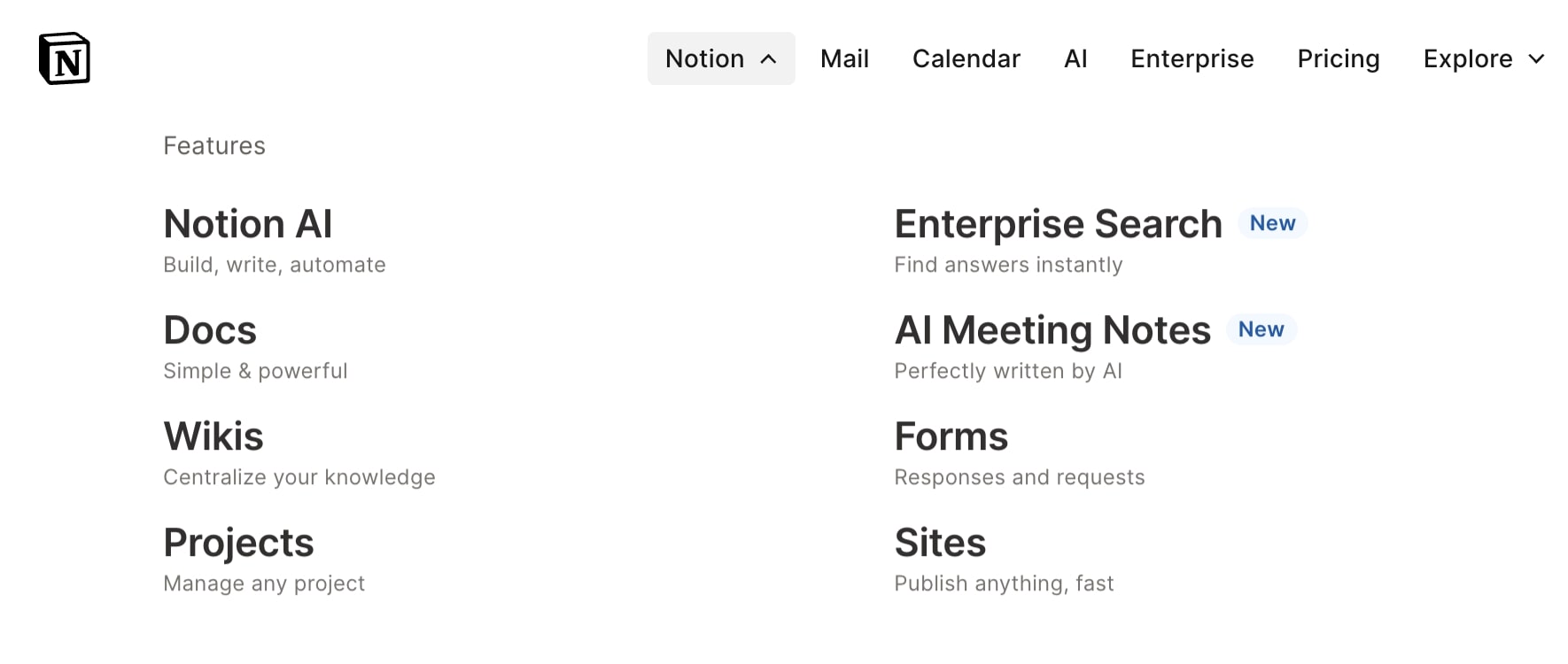
Products: Wiki, Docs, Projects, Notion AI, etc.
Now, all we do is select one audience and map it to one product. We can mix and match these to create unlimited topic ideas, which I’ll show you in step two.
2. Map out your topic clusters
Now that we have our audience and products, we can use these two data points to derive topic cluster ideas.
Following our example of Notion, I’m going to select the marketers as the audience and I'm going to select projects as the feature (aka the product).
Depending on the type of company you are, a SaaS company, an ecommerce company, a service-based business, or even a media company, you will need to figure out what products or services your business offers.
Now, we have:
- Audience: Marketers
- Products: Projects
- Topics: TBD
It’s now our job as marketers to figure out all the use cases a marketer would have when using the projects feature.
These use cases become the seed of our topic ideas.
If you have a hard time figuring this out, you can ask ChatGPT to help you figure out topic ideas based on your own understanding of the desired audience and product combination.
Here is a prompt you can use in your desired LLM to help you find topic ideas:
I'm using the APTK content framework to generate content strategy ideas.
My website: [your website URL]
My audience: [your audience]
My product or service: [products/features or service offerings]
Based on this audience–product pairing, give me a list of topic cluster ideas that reflect the typical workflows, challenges, goals, and questions this audience has related to this product.
Focus on practical use cases and themes, not just the features of the product, and suggest content topics I may not have considered yet.
Just give the list of cluster topics, no need to group into content pillars or add explanations.
Using this prompt, I got these ideas for the Notion example:
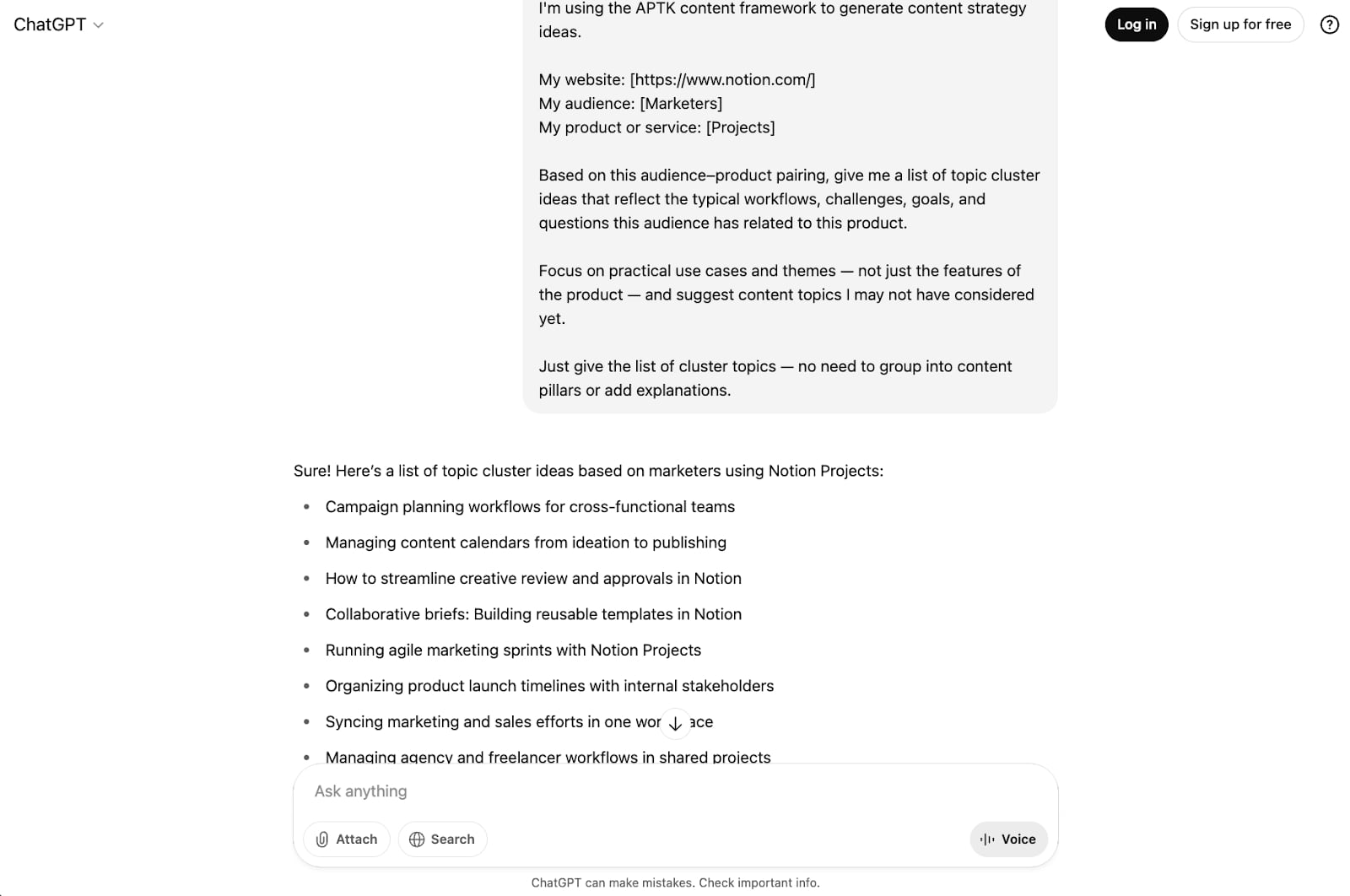
As you can see there are a ton of ideas now. Here, you will have to use your human brain (sorry) to extract the right ideas that make sense. Often, maybe 10-20% of these outputs make sense and the rest is garbagio.
But, to help you extract the exact topics, you can use this follow up prompt.
Based on the list above, extract a list of concise topic cluster themes (2–5 words each) that summarize the core idea of each sentence.
Only include the unique cluster topics. No duplicates, no full sentences.
And here’s what I got:
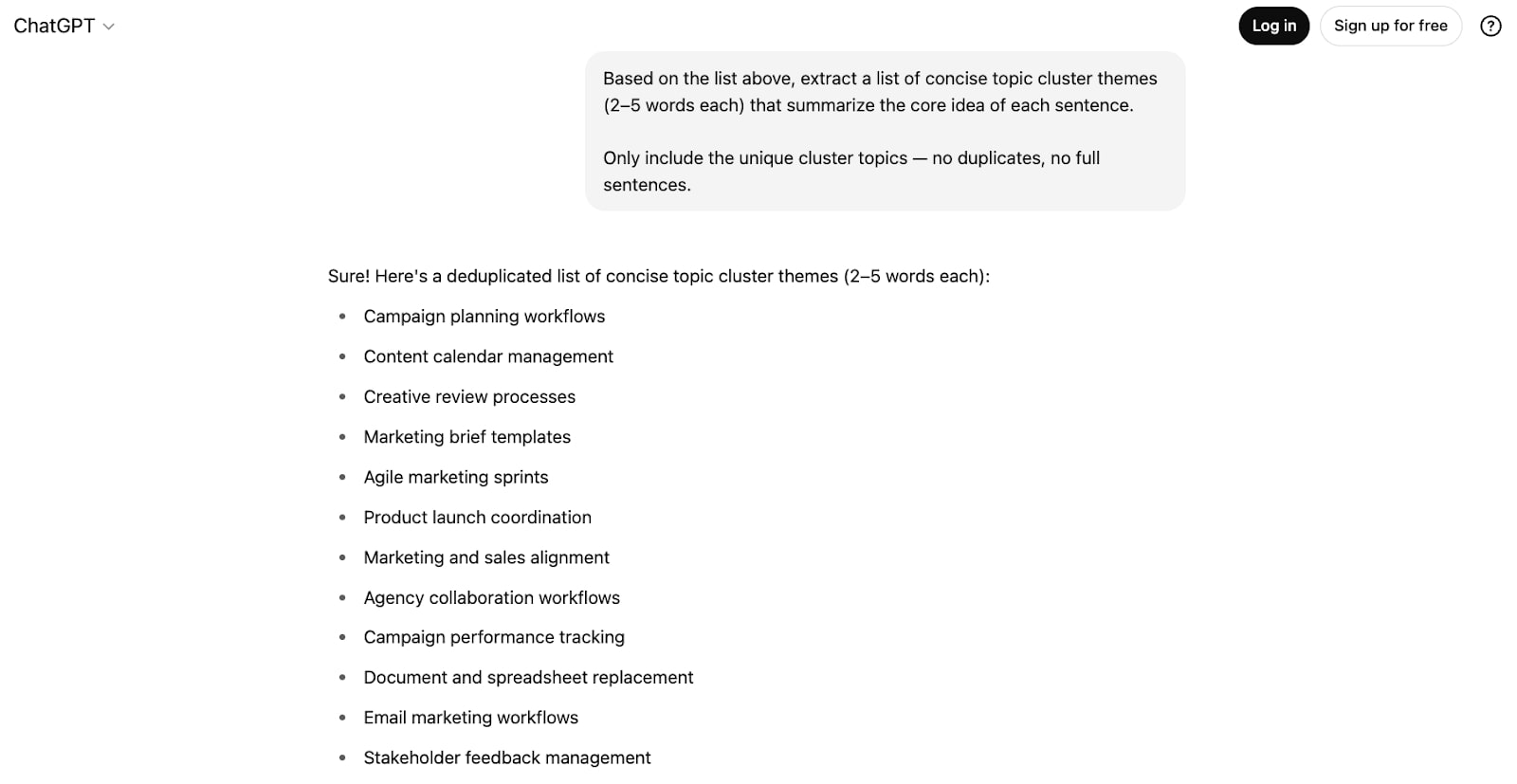
Now, I’ve got a handful of different topics that I can start to build authority around. Again, don’t just blindly listen to what ChatGPT (or any LLM for that matter) tells you. It doesn’t know the nuances of your business and it would be reckless of you to assume it does.
But the second topic from the screenshot above, “content calendar management,” aligns a lot. I’m actually going to simplify this to just “content calendars.”
And there we go!
Now, I want to create topical authority around content calendars. This will lead us into step three.
3. Identify individual keywords across the user search journey for each topic cluster
Now that we have our topic ideas, it’s time to find individual keywords to target to help us build authority in our given topic.
Revisiting step two, I came up with the topic idea “content calendars.” Now, we want to find at least five keywords in this category in order to start building topical authority.
But we don’t want these to just be random keywords related to content calendars. We want to think methodically about how people would be searching around this topic and how it will lead to them becoming a customer of ours (aka Notion hypothetically speaking).
Yes, we want to establish topical authority. But we have to ask why we want to do that. And when we do, we realize that it’s because we want to get more users or customers from search engines. So this is where my content marketing strategy approach comes to play.
I wrote a guide on how I do this for SaaS (software as a service) companies, but it can apply to almost any business.
The idea is you want to take your topic and map it across the entire user search journey. The search journey comes straight out of one of my favorite marketing books called Breakthrough Advertising. It was written in the 1960s so it’s not about search engines per se, but it is about how people go through a buyer’s journey. Which today, can be applied to how people search for things on the internet.
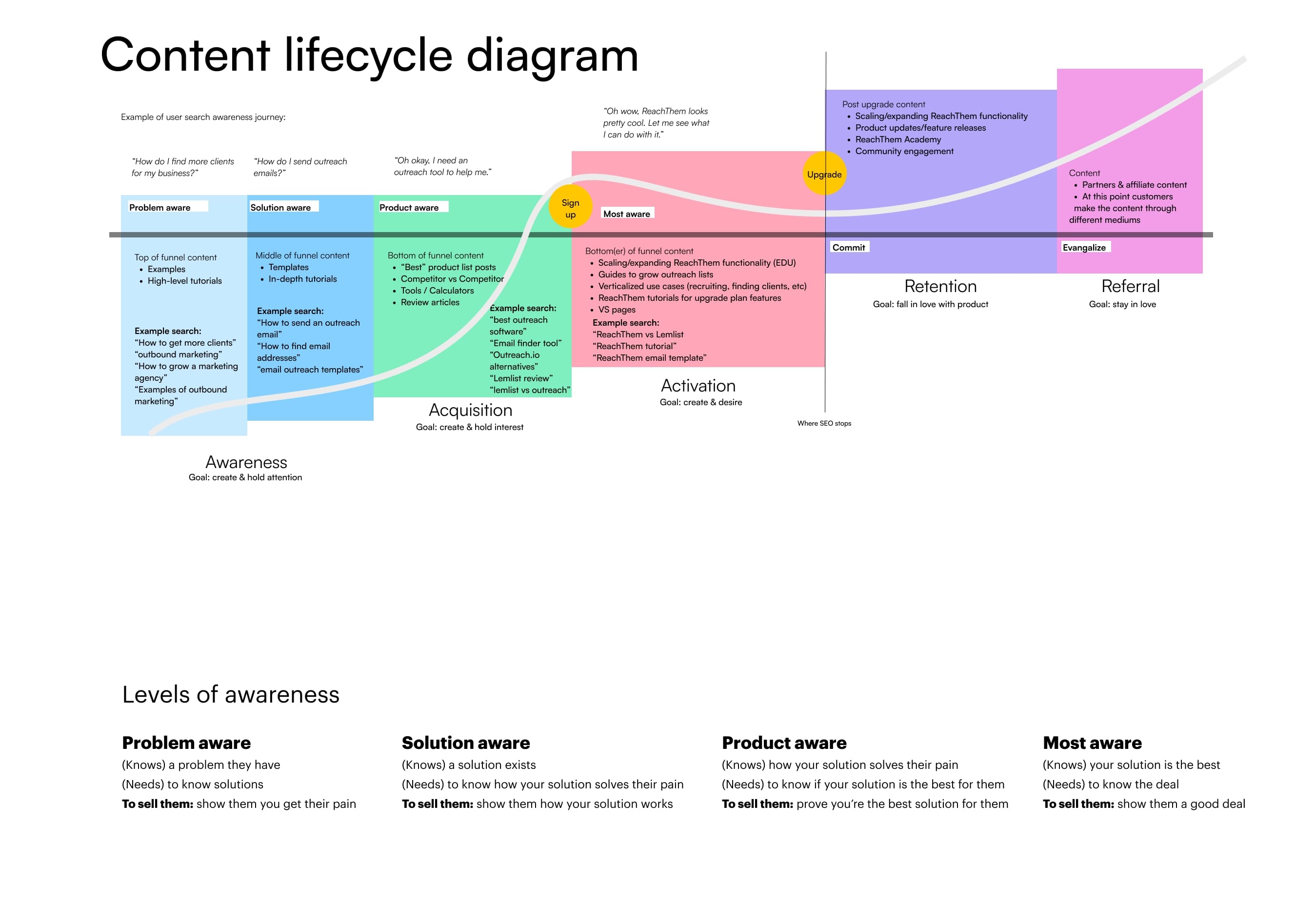
This is the journey:
- Problem aware: Top of funnel keywords
- Solution aware: Middle of funnel keywords
- Product aware: Bottom of funnel keywords
- Most aware: Bottom-er of funnel keywords
I’m not going to go too in-depth about how to do keyword research here, but I do have some free content on my YouTube channel about it you can check out here. Or, you can check out this video that will show you how to uncover keywords (without paying for any tools):
I also have a course that goes over all of this in depth if you want to check that out. But I already have tons of free content.
Anyways, here’s what this looks like for our topic of content calendars:
- Problem aware: content calendar examples
- Solution aware: content calendar template, how to create a content calendar
- Product aware: best content calendar software
- Most aware: asana review, monday review
As you can see, all of these keywords are related to the topic of content calendars. Now, you might see in the ‘most aware’ stage that I added other brands. This is because once someone in the ‘product aware’ stage searches for the best content calendar software, they will inevitably learn about tools like Asana or Monday.com — both competitors of Notion in some aspects (at least when it comes to content calendars).
Targeting those most aware keywords, as a brand like Notion, will allow us to get people searching for asana to learn about our brand too. It’s sorta brand-jacking, but almost all SaaS companies that invest in SEO do this.
Here’s actually a screenshot from my iPad of mapping all of this out for this Notion idea:

You can see, I have multiple topics with keywords under each.
Okay, now it’s time to add these keywords to our content calendar and prioritize them so we can create real content that helps us build topical authority for the term “content calendars.”
4. Prioritize keywords in your content calendar
Now is the editorial part of this. At this point, we know our topic and we know what keywords to go after to build that topical authority.
But this is the part where you can mess up if you don’t put in the proper effort to create the best piece of content the internet has seen about your keyword.
First, let’s revisit our keywords again:
- Content calendar examples
- Content calendar template
- How to create a content calendar
- Best content calendar software
- Asana review
Based on all my years of experience in content marketing, I can tell you that these are the order in which I would target these keywords:
- Asana review
- Content calendar template
- Content calendar examples
- Best content calendar software
- How to create a content calendar
And, to turn these into real titles, I would use these meta titles to target these keywords (make sure they’re always under 58 characters long):
- Asana review: Is it the best for project management?
- 20 best content calendar templates I would use again
- 30 best content calendar examples from real brands
- 10 best content calendar software and platforms in 2025
- How to create a content calendar in 5 simple steps
I’ll be honest, it’s hard for me to put into words why I would approach it in this order because it’s so ingrained in me now based on writing thousands of blog posts and seeing how fast they show results. But I’m going to try my best.
First, “review” articles tend to be the easiest to rank because they’re generally low competition. Not a lot of people know how to write real, honest reviews. So I would start there.
Then, the rest of the order is in relation to how I would be able to reference each piece. This will make more sense in step six where we talk about interlinking. But for example, when I’m writing an article about “content calendar examples,” I would be able to link out to an article I already wrote before going after “content calendar template.”
And on the same token, when I write an article around the “best content calendar software,” I would be able to link out to all of the articles I already have around “Asana review,” “content calendar examples,” etc.
So it really comes down to how you think about the order of operations within your content strategy. It’s something you just develop over time through pattern recognition and intuition. I literally don’t know how to put this into a framework so I’m just going to be honest and not lie about it.
But, in the end, it also doesn’t totally matter. We could have produced content for all of these five keywords before we even hit publish on any of them.
Okay, now let’s take these and turn them into pages that will actually rank.
5. Write your articles with original insights
Search engines love high-quality content. But that’s subjective. So how do you actually go about creating in depth content? I already wrote a full guide on how to write SEO blog posts. And I even have a 40 minute YouTube video of me doing it live that you can watch here:
But overall, there are a few things you want to do.
Gone are the days of hiring mediocre freelancer writers and having them fake their expertise about your industry or brand.
Today, Google, and LLMs, CRAVE content that the internet has not seen before. Of course, all of this content needs to be optimized and written in a way for search engines to understand (which I show you how to do in the blog and video linked above).
But the other part of it is the art of copywriting and getting people to actually trust what you have to say. The only way you can do this is if you actually know what you’re talking about.
I’m able to outrank billions dollar brands because I write from a place of lived experience. Those brands are using freelance ghost writers that know nothing about the nuances of those businesses and the pain points their readers have.
You will always lose to someone who is the ideal audience and knows all the pain points. You need to walk in the shoes of your reader. And your readers are not dumb. They will quickly realize if you’re full of it or if you actually know what you’re talking about.
So first there’s that. Writing from a place of lived experience. And doing so in a way that is formatted (on-page SEO) for search engines to easily crawl, index, and rank accordingly.
The next part is to have original media in your blog posts. Use this article as an example. It’s 100% written by me. I did not use AI at all to create the outline or even write anything on this page. And, I have original media in the form of screenshots/images and my own YouTube videos.
It’s why my blog does so well:
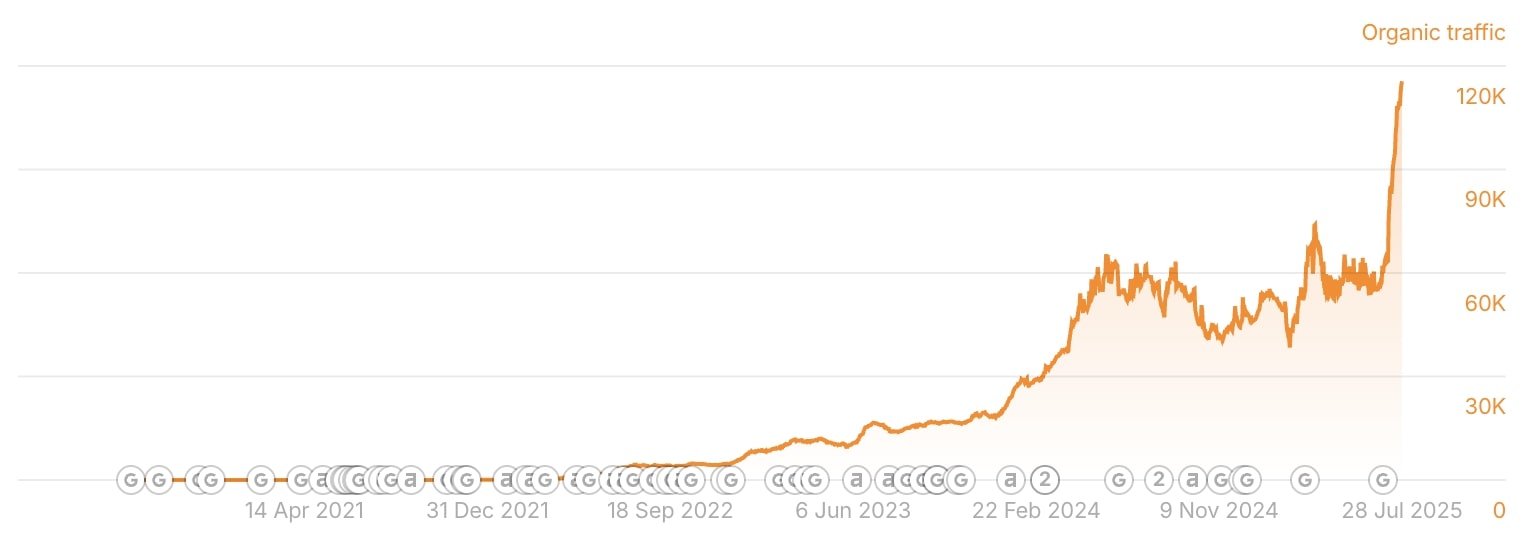
I’m not here to game the algorithm or rank for ranking sake. I’m here to talk about what I’m passionate about and know best, marketing. And I get a lot of joy out of helping others because I know there’s so much marketing content that is not in the best interest of marketers. It’s designed to sell, not inform.
So ya, write original stuff. And if you don’t have original insights or lived experience, well I hate to break it to you: you probably have no business creating content in that space. Focus on what you know.
Okay, at this point, you’ll have five expert-led content pieces that are designed to rank high and build trust to the point where people may use your products or services.
Next, is to help search engines understand the relationship between these posts so it’s easier for us to build topical authority.
6. Interlink your pages to build topical expertise
This part is straightforward. You want to make sure that you interlink all of your related posts together. We briefly touched on this in step four, but all you need to do is link out to existing relevant pieces of content when you’re writing.
Or, once you publish a new blog post, you need to go back into your CMS and link out to your new blog post in older articles.
That’s it.
This will help create a “web” between your web pages. (Oh look, that's where that word comes from!) This web is what creates the relationship between your pages and will help you build topical authority.
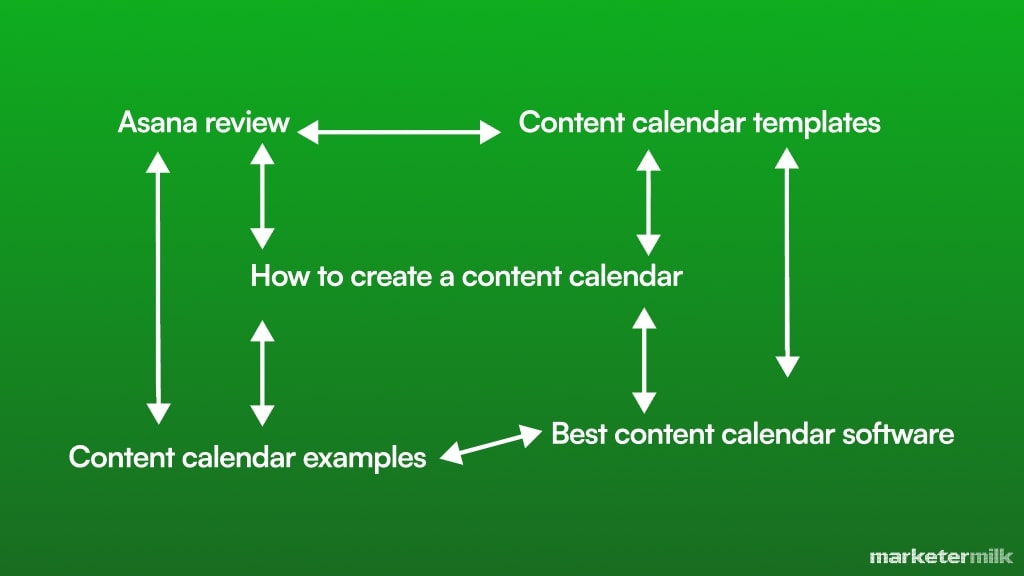
Some SEOs say that you don’t need to link all your pages together and that Google is smart enough to understand that you have all of this related content. But, I think it’s best to interlink everything so it helps Google speed up the indexing process of your pages. And at the same time, it helps your readers see your other content and this will increase your time on site — which so increases your overall search engine rankings.
Do all of these steps, and give it a couple weeks, and I promise you will start to see results in your Google Search Console. If you don’t you probably skipped one of these steps or you went after the wrong topic that is unrelated to your business.
Why is topical authority important?
Topical authority is important because it acts as your social currency towards search engines. Without topical authority, you will have a hard time ranking for keywords that actually matter for your business.
The best mental model you can have is to realize Google's entire business model relies on delivering the best possible results for every search query. When someone searches for something, Google wants to surface content from sites that have proven expertise in that specific area. This is where topical authority becomes your competitive advantage (and MOAT).
Here's what happens when you build strong topical authority:
You rank faster for new content. Once Google recognizes you as an expert in your niche, new articles within that topic get indexed and ranked much quicker. I've ranked #1 in just 3 hours sometimes because of this.
You need fewer backlinks to compete. While backlinks still matter, topical authority can compensate for a weaker backlink profile. I regularly outrank sites with tons of backlinks because my topical relevance is stronger for specific keywords. I actually stopped caring about backlinks altogether, and focus most of my energy on writing the best stuff no one has seen.
You capture more relevant search terms naturally. When you build authoritative content around a topic, you naturally start ranking for hundreds of related keywords you never explicitly targeted. This happens because modern semantic search understands the relationships between concepts and not just exact keyword matches. But, you can’t control this as much. So you still want to target a specific keyword (don’t listen to what SEO influencers say on LinkedIn or X).
Your content aligns with search intent better. Sites with strong topical authority understand their audience deeply. This means your content naturally matches what people are actually looking for, which Google rewards with higher rankings. Bada bing bada boom.
Also, the technical SEO community (bless those people) has started to measure topical authority more systematically. While there's no official "topical authority score" from Google, you can track your progress by monitoring how quickly new content ranks, how many topic-related keywords you rank for, and your average position for keywords within your core topics.
As we went over in step six, internal links are also really important. They help Google understand the relationships between your pages and reinforce your expertise across relevant topics.
For most SEO projects, I recommend starting with one core topic and expanding from there (like we did above). Pick something directly related to your product or service, then systematically cover every angle (search intent) your audience cares about. This focused approach beats trying to be everything to everyone.
And the recent Google algorithm updates have made this even more critical. Sites that maintained focus on their core topics saw traffic increases, while those that chased every trending keyword got penalized. Google is essentially forcing us to pick a lane and stay in it, which honestly makes sense for both search engines and users.
If you actually care about getting organic traffic from search engines, you need to take your topical authority strategy seriously. And I hope this post made you realize that. See you in the next one.
Much love, peace out! ❤️
Get the weekly newsletter keeping +33,000 marketers in the loop.










